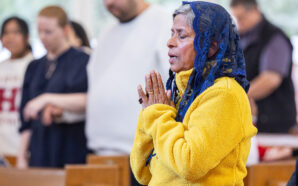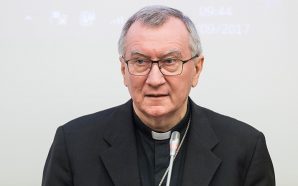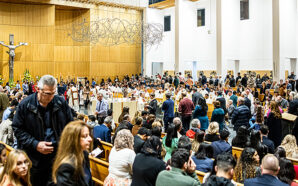Homily for the Feast of Christ the King
Readings: Daniel 7:13-14; Psalm 92; Apocalypse 1:5-8; John 18:33-37
21 November 2021
Being at heart a twenty first century Australian republican who believes in the separation of church and state, I have to confess to being not all together comfortable with celebrating today’s feast of Jesus as the Universal King, the King of the Universe. So what to make of it? How can we draw fruit from such a time constrained feast which purports to be universal? The feast was instituted by Pope Pius XI during the Holy Year in 1925, marking the 1600th anniversary of the Council of Nicea. Pius reminded the bishops of the content of his first encyclical letter to them in 1922: “We referred to the chief causes of the difficulties under which mankind was labouring. And We remember saying that these manifold evils in the world were due to the fact that the majority of men had thrust Jesus Christ and his holy law out of their lives; that these had no place either in private affairs or in politics: and we said further, that as long as individuals and states refused to submit to the rule of our Saviour, there would be no really hopeful prospect of a lasting peace among nations.”
Listen at https://soundcloud.com/frank-brennan-6/homily-211121
His first three years as pope confirmed his apprehensions about the state of the world: ‘What We said at the beginning of Our Pontificate concerning the decline of public authority, and the lack of respect for the same, is equally true at the present day. “With God and Jesus Christ excluded from political life, with authority derived not from God but from man, the very basis of that authority has been taken away, because the chief reason of the distinction between ruler and subject has been eliminated. The result is that human society is tottering to its fall, because it has no longer a secure and solid foundation.”’[1]
Instituting the feast we celebrate today, Pius XI proclaimed: “Nations will be reminded by the annual celebration of this feast that not only private individuals but also rulers and princes are bound to give public honour and obedience to Christ.”
Like all popes, Pius XI was a man of his times. And thank God, the times have changed. There is no way that back in 1925 he would have agreed to Vatican II’s Pastoral Constitution on the Church in the Modern World (Gaudium et Spes) which was to be promulgated only 40 years later. In 1965, the bishops of the world made observations on the rightful independence of earthly affairs. They acknowledged that many of their contemporaries “seem to fear that a closer bond between human activity and religion will work against the independence of people, of societies, or of the sciences”. Addressing this fear, they observed:
“If by the autonomy of earthly affairs we mean that created things and societies themselves enjoy their own laws and values which must be gradually deciphered, put to use, and regulated by people, then it is entirely right to demand that autonomy. Such is not merely required by us moderns, but harmonizes also with the will of the Creator. For by the very circumstance of their having been created, all things are endowed with their own stability, truth, goodness, proper laws and order. We must respect these as we isolate them by the appropriate methods of the individual sciences or arts. Therefore if methodical investigation within every branch of learning is carried out in a genuinely scientific manner and in accord with moral norms, it never truly conflicts with faith, for earthly matters and the concerns of faith derive from the same God.”[2] This must go for our understanding of contemporary politics and for our deeper insights into human sexuality.
Sixty years ago, the bishops of our Church gathered at the Second Vatican Council made no Pius XI-type claim that “rulers and princes are bound to give public honour and obedience to Christ”. There was good reason for the change of thinking in the forty years between Pius XI’s proclamation of today’s feast and the Vatican Council’s declaration that the Church “is bound to no particular form of human culture, nor to any political, economic or social system.”[3]
If Pius XI were to be surprised by the changes between 1925 and 1965, imagine what he would have made of the changes between 1925 and today. The last chapter of Diarmaid MacCulloch’s epic A History of Christianity considers “The Culture Wars”. MacCulloch sums up much of our present predicament in two sentences: “Behind the passing conflicts of the moment lies a debate throughout Christianity about whether the Bible and Christian tradition can be wrong and can be changed. It is also a debate about whether God’s plan for the world centres on the supremacy of heterosexual men.”[4] Pius XI had told his bishops: “It will be for you later to explain in a manner suited to the understanding of the faithful what We are … saying concerning the Kingship of Christ, so that the annual feast which We shall decree may be attended with much fruit and produce beneficial results in the future.” A century on, our starting point has to be very different from that of Pius XI because the understanding of the faithful is now so different from what it was then. I, for one, am grateful that the understanding of the faithful is now so different.
In the coming weeks, our Parliament will be asked to consider proposals for a Religious Discrimination Bill. Given that all human rights are to be treated equally, it is not good enough that religious freedom at a national level be treated simply as a catalogue of exceptions or exemptions in the Sex Discrimination Act. That leaves the perception that religious folk are always engaged in special pleading wanting to discriminate adversely against others.
Religious schools should be able to choose leaders for their staff who are animated by and supportive of the school’s religious ethos and beliefs. If political parties, women’s groups and Aboriginal organisations can be selective in their choice of leaders and staff who “get it” and who want to “evangelise their mission”, why shouldn’t religious groups? Religious schools, spared state intervention, should be able to choose competent staff so as to better enable the educational institution to be conducted in accordance with its religious tenets, beliefs, teachings, principles or practices.
We should not discriminate against our fellow citizens on the basis of religion or belief in the provision of public services or in our activities in the public square. But neither should we discriminate against our fellow citizens on the basis of their sexuality or gender in the provision of public services or in our activities in the public square.
We are entitled to conduct our institutions consistent with Church teaching but not in a manner which discriminates adversely against those of a different sexual orientation. We should treat them in the same manner as those of a heterosexual orientation. If we were to insist that all heterosexual teachers be celibate or living in a sacramental marriage, we would have a case for discriminating against teachers in a same sex relationship. But given that we turn a blind eye (or perhaps even a compassionate and understanding one) to those heterosexual teachers not living in a sacramental marriage, we should surely do the same for those thought to be living in a same sex relationship. The time has come not to discriminate against people in church, in society or in the Kingdom on the basis of their sexual orientation.
As we chart our way through these turbulent waters of change on this feast of Christ the King, I take heart from Karl Rahner’s observation: “The only really absolute mysteries in Christianity are the self-communication of God in the depths of existence – which we call grace, and in history – which we call Christ.” In today’s gospel from John where Jesus is subjected to cross-examination by Pilate who is sitting in judgment upon him, Jesus ultimately admits to being a king but in a specific sense unfamiliar to those who exercise power over others: “Yes, I am a king. I was born for this, I came into the world for this: to bear witness to the truth, and all those who are on the side of truth listen to my voice.” Pilate responds with the question which is left to all of us to answer: “Truth? What is that?” Rejoicing that the reign of God is upon us and being attentive to the understanding of the faithful (especially regarding politics and sexuality), we are commissioned to work for the coming of that kingdom of justice, love and peace which is so universal that it cannot possibly be centred on the supremacy of heterosexual men.
[1] Pope Pius XI, Quas Primas, https://www.vatican.va/content/pius-xi/en/encyclicals/documents/hf_p-xi_enc_11121925_quas-primas.html
[2] Gaudium et Spes #36 available at https://www.vatican.va/archive/hist_councils/ii_vatican_council/documents/vat-ii_const_19651207_gaudium-et-spes_en.html (rendered gender neutral)
[3] Ibid, #42
[4] Diarmaid MacCulloch, A History of Christianity, Allen Lane, 2009, pp. 1009-1010
Fr Frank Brennan SJ is the Rector of Newman College, Melbourne, and the former CEO of Catholic Social Services Australia (CSSA). He has been appointed a peritus at the Fifth Plenary Council of the Australian Catholic Church.








